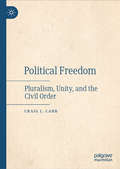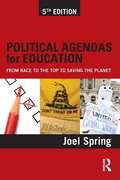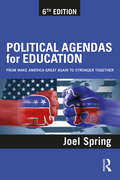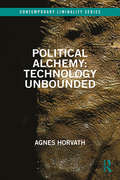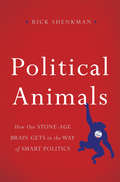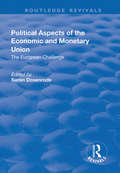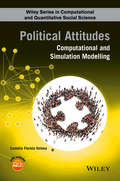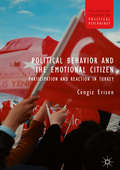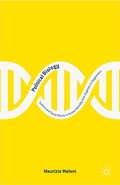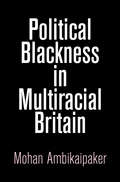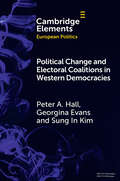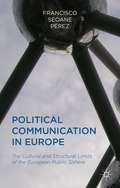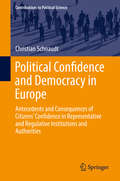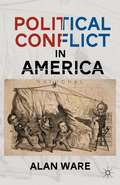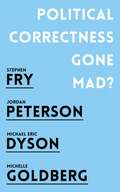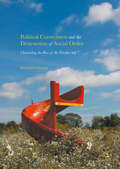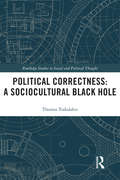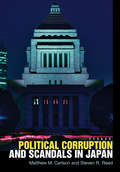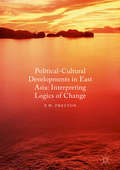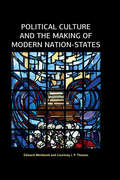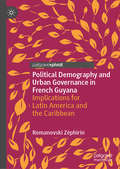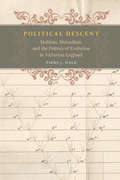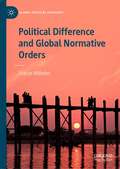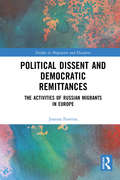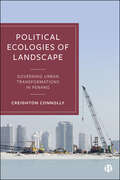- Table View
- List View
Political Freedom: Pluralism, Unity, and the Civil Order
by Craig L. CarrThe purpose of this work is to discuss and explain the nature of political freedom. The approach is interdisciplinary, drawing from social theory, history, and law, as well as philosophy and political theory. The argument presented defends a view of political freedom as a social norm that has gained great prominence in those places where it has emerged through time as a social mechanism that supports social order and brings security to social life. Regarded as a social norm, political freedom promotes the toleration of the religious, cultural, ideological, and moral differences that generate normative conflict throughout society. The resultant understanding of political freedom therefore defends a distinction between political and personal freedom and separates the idea of political freedom from the individualism with which it is normally associated in most philosophical literature. The argument also indicates why it is appropriate to regard political freedom as a central virtue of social justice.
Political Agendas for Education
by Joel SpringThe Fifth Edition of Joel Spring's ongoing documentation and analysis of political agendas for education reflects the major political issues in education since 2008. This edition focuses on the education sections of the 2012 Republican, Democratic, Green, and Libertarian Party platforms. Taking a fresh look at the social and political forces, educational research, and ideologies shaping the educational agendas of these political parties and a comparative approach, the book stimulates reflection and discussion. New coverage in the Fifth Edition includes: * The political coup called Race to the Top* Common Core State Standards and national testing based on the Standards* Explosion of online instruction* Debates about teacher evaluations and merit pay* Growing for-profit education industry* New agenda for American Education: Constitutional amendment; long life and happiness; environmental education Political Agendas for Education is essential reading for courses dealing with the politics of education, foundations of education, educational leadership, and curriculum studies, and for educational scholars, professionals, policymakers, and all those concerned with the politics of education in the U.S. and its consequences for schools and society.
Political Agendas for Education: From Make America Great Again to Stronger Together
by Joel SpringFollowing the epic, contentious 2016 presidential election, Joel Spring’s ongoing documentation and analysis of political agendas for education reflect the major political issues since 2012. Here he examines the 2016 education planks of the Republican, Democratic, Libertarian, and Green Parties, using their official platforms and other statements, speeches given by each candidate, and media reports and publications. Each party’s position is linked to previous political movements in education. Spring offers an alternative agenda for American schools, including a proposed education amendment to the U.S. Constitution and replacing human capital agendas with goals emphasizing education for a long life and happiness. Taking a fresh look at the social and political forces, educational research, and ideologies shaping their educational agendas and a comparative approach, the book stimulates reflection and discussion. Updates and changes in the Sixth Edition: Betsy DeVos’s education agenda supporting vouchers, free market competition and for-profit schools and its relationship to the education section of the 2016 Republican platform The important role religion and culture played in the evolution of Republican education policies after the school prayer and Bible decisions of the 1960s The influence of human capital economics on Democratic education proposals How No Child Left Behind and Democratic President Barack Obama opened doors to the growth of the for-profit education industry and investment bankers The 2016 Democratic positions on the cost of higher education and student loan debts The Democratic left as represented by the 2016 campaign of Democrat Bernie Sanders and his influence on the presidential candidate Hillary Clinton and the Democratic Party platform The education proposals of the Green and Libertarian parties
Political Alchemy: Technology Unbounded (Contemporary Liminality)
by Agnes HorvathThis book explores politics as a form of alchemy, understood as the transformation of entities through an alteration of their identities. Identifying this process as a common denominator of many political phenomena, such as EU integration, mediatisation, communism or globalisation, the author demonstrates not only the widespread presence of alchemical techniques in politics, but also the acceleration of their deployment. A study of the steady growth of power as it reaches a continuous and permanent stage, thus avoiding the inherent difficulties connected with birth and death of political organisations and institutions, this volume reveals political alchemy to be a form of self-sustaining growth through sterile multiplication, devoid of meaning. Revealing both the integrative and disintegrative nature of a political process that, while appearing to work in the interests of all, in fact produces apathy, desperate mobilisation and despair by crushing concrete entities such as personality and tradition, Political Alchemy: Technology Unbounded will appeal to scholars of sociology and anthropology with interests in social theory and political thought.
Political Animals: How Our Stone-age Brain Gets In The Way Of Smart Politics
by Rick ShenkmanCan a football game affect the outcome of an election? What about shark attacks? Or a drought? In a rational world the answer, of course, would be no. But as bestselling historian Rick Shenkman shows in Political Animals, our world is anything but rational. This isn’t because we aren’t smart. Instead, modern cues are setting off ancient, instinctive responses that worked to keep us safe in the Stone Age but lead us astray today. Pop culture tells us we can trust our instincts. But science is demonstrating that when it comes to politics, our Stone Age brains can malfunction and misfire. Fortunately, we can learn to override our instincts and ensure that they work in our favor. Drawing on science, politics, and history, Shenkman explores the hidden reasons behind our political choices and uncovers the invisible forces that are truly responsible for victory or defeat at the ballot box.
Political Aspects of the Economic Monetary Union (Routledge Revivals)
by Soren Zibrandt von Dosenrode-LyngeThis title was first published in 2002: Concentrating on the myriad political aspects of European Monetary Union (EMU), this volume places the EMU and the European Union (EU) in a global context. It should be useful for scholars and students of European studies, economics, modern history and international relations. Libraries and embassies should also find it a valuable reference tool.
Political Attitudes: Computational and Simulation Modeling
by Camelia F. VoineaPolitical Attitudes: Computational and Simulation Modeling Camelia Florela Voinea, Department of Political Science, International Relations and Security Studies, University of Bucharest, Bucharest, Romania Political Science has traditionally employed empirical research and analytical resources to understand, explain and predict political phenomena. One of the long-standing criticisms against empirical modeling targets the static perspective provided by the model-invariant paradigm. In political science research, this issue has a particular relevance since political phenomena prove sophisticated degrees of context-dependency whose complexity could be hardly captured by traditional approaches. To cope with the complexity challenge, a new modeling paradigm was needed. This book is concerned with this challenge. Moreover, the book aims to reveal the power of computational modeling of political attitudes to reinforce the political methodology in facing two fundamental challenges: political culture modeling and polity modeling. The book argues that an artificial polity model as a powerful research instrument could hardly be effective without the political attitude and, by extension, the political culture computational and simulation modeling theory, experiments and practice. This book: Summarizes the state of the art in computational modeling of political attitudes, with illustrations and examples featured throughout. Explores the different approaches to computational modeling and how the complexity requirements of political science should determine the direction of research and evaluation methods. Addresses the newly emerging discipline of computational political science. Discusses modeling paradigms, agent-based modeling and simulation, and complexity-based modeling. Discusses model classes in the fundamental areas of voting behavior and decision-making, collective action, ideology and partisanship, emergence of social uprisings and civil conflict, international relations, allocation of public resources, polity and institutional function, operation, development and reform, political attitude formation and change in democratic societies. This book is ideal for students who need a conceptual and operational description of the political attitude computational modeling phases, goals and outcomes in order to understand how political attitudes could be computationally modeled and simulated. Researchers, Governmental and international policy experts will also benefit from this book.
Political Behavior and the Emotional Citizen
by Cengiz ErisenThis book studies the role of emotions, such as anger, anxiety, and enthusiasm, across various domains of political behavior in Turkey. The author considers how emotions affect evaluations of leadership performance, levels of intolerance, likelihood of following and participating in politics, perceived threats from terrorism, and electoral decisions, including vote choice. Using a nationally representative survey and experimental data, this study empirically analyses the causal associations among the primary factors explaining the Turkish electorate's political attitudes and behaviours. The book will be of particular interest to academics, university students, and policymakers seeking to learn more about contemporary Turkish politics amid the recent political and social turmoil that has affected all parts of this society.
Political Biology: Science and Social Values in Human Heredity from Eugenics to Epigenetics
by M. MeloniThis book explores the socio-political implications of human heredity from the second half of the nineteenth century to the present postgenomic moment. It addresses three main phases in the politicization of heredity: the peak of radical eugenics (1900-1945), characterized by an aggressive ethos of supporting the transformation of human society via biological knowledge; the repositioning, after 1945, of biological thinking into a liberal-democratic, human rights framework; and the present postgenomic crisis in which the genome can no longer be understood as insulated from environmental signals. In Political Biology, Maurizio Meloni argues that thanks to the ascendancy of epigenetics we may be witnessing a return to soft heredity - the idea that these signals can cause changes in biology that are themselves transferable to succeeding generations. This book will be of great interest to scholars across science and technology studies, the philosophy and history of science, and political and social theory.
Political Blackness in Multiracial Britain (The Ethnography of Political Violence)
by Mohan AmbikaipakerOne evening in 1980, a group of white friends, drinking at the Duke of Edinburgh pub on East Ham High Street, made a monstrous five-pound wager. The first person to kill a "Paki" would win the bet. Ali Akhtar Baig, a young Pakistani student who lived in the east London borough of Newham, was their chosen victim. Baig's murder was but one incident in a wave of antiblack racial attacks that were commonplace during the crisis of race relations in Britain in the 1970s and 1980s. Ali Akhtar Baig's death also catalyzed the formation of a grassroots antiracist organization, Newham Monitoring Project (NMP) that worked to transform the racist victimization of African, African Caribbean and South Asian communities into campaigns for racial justice and social change.In addition to providing a 24-hour hotline and casework services, NMP activists worked to mitigate the scourge of racial injustice that included daily racial harassment, hate crimes and antiblack police violence. Since the advent of the War on Terror, NMP widened its approach to support victims of the state's counterterror policies, which have contributed to an unfettered surge in Islamophobia.These realities, as well as the many layers of gendered racism in contemporary Britain come to life through intimate ethnographic storytelling. The reader gets to know a broad range of east Londoners and antiracist activists whose intersecting experiences present a multifaceted portrait of British racism. Mohan Ambikaipaker examines the life experiences of these individuals through a strong theoretical lens that combines critical race theory and postcolonial studies. Political Blackness in Multiracial Britain shows how the deep processes of everyday political whiteness shape the state's failure to provide effective remedies for ethnic, racial, and religious minorities who continue to face violence and institutional racism.
Political Change and Electoral Coalitions in Western Democracies (Elements in European Politics)
by Peter A. Hall Georgina Evans Sung In KimThis Element documents long-term changes in the political attitudes of occupational groups, shifts in the salience of economic and cultural issues, and the movement of political parties in the electoral space from 1990 to 2018 in eight Western democracies. We evaluate prominent contentions about how electoral contestation has changed and why support for mainstream parties has declined while support for challenger parties has increased. We contribute a new analysis of how the viability of the types of electoral coalitions assembled by center-left, center-right, radical-right, and Green parties changes over these decades. We find that their viability is affected by changes over time in citizens' attitudes to economic and cultural issues and shifts in the relative salience of those issues. We examine the contribution these developments make to declining support for mainstream center-left and center-right coalitions and increasing support for coalitions underpinning radical-right and Green parties.
Political Communication in Europe: The Cultural and Structural Limits of the European Public Sphere
by Francisco Seoane PérezThe disconnection between the institutions of the EU and the people of Europe has often been attributed to the existence of a communication gap resulting from the failure of national medias and politicians to convey the importance of the EU. This book challenges that idea instead showing that the fault lies with the idea and institutions of the EU.
Political Confidence and Democracy in Europe: Antecedents and Consequences of Citizens’ Confidence in Representative and Regulative Institutions and Authorities (Contributions to Political Science)
by Christian SchnaudtThis book examines the antecedents and consequences of citizens’ confidence in different political institutions and authorities. Its main argument states that a distinction between confidence in representative and regulative institutions and authorities is of crucial importance in order to gain novel insights into the relevance of political confidence for the viability of democratic systems. Relying on individual-level data from the European Social Survey (ESS), the author provides empirical evidence that citizens from a total of twenty-one European countries make a distinction between confidence in representative institutions and authorities and confidence in regulative institutions and authorities. Furthermore, the author shows that both types of political confidence emanate from different sources and are associated with varying consequences. Overall, these findings indicate that confidence in representative and confidence in regulative institutions and authorities establish two qualitatively different types of political confidence, each with distinct implications for the functioning and well-being of modern democracies.
Political Conflict in America
by Alan WareRecently, there has been a high level of conflict in American politics. Massive disagreements over government policies have pitted one group of Americans against another. This book explores how and why this style of politics developed and argues that fundamental disagreements between Americans have always been at the root of its politics.
Political Correctness Gone Mad?
by Stephen Fry Michelle Goldberg Michael Dyson Jordan Peterson&‘Without free speech there is no true thought.&’ –Jordan Peterson &‘If you&’re white, this country is one giant safe space.&’ –Michael Eric Dyson The Munk debate on political correctness Is political correctness an enemy of free speech, sparking needless conflict? Or is it a weapon in the fight for equality, restoring dignity to the downtrodden? How should we talk about the things that matter most in an era of rapid social change? Four thinkers take on one of the most heated debates in the culture wars of the twenty-first century.
Political Correctness and the Destruction of Social Order
by Howard S. SchwartzThis book develops a psychoanalytic theory of political correctness and the pristine self, which is defined as a self touched by nothing but love. It explores the damage that political correctness can do to social order. Applications include the breakdown of social capital, the financial crisis, and Occupy Wall Street. Long an issue for conservatives, alarm over political correctness has now spread to the liberal side of the political spectrum. As Schwartz argues, all have reason to be concerned. The psychology that underlies political correctness has the potential to be extremely destructive to social organization on every level. Schwartz discusses the primitive roots of political correctness and, through the use of case studies, shows its capacity for ruination. The book focuses on a transformation in the idea of the self, and specifically the rise of the pristine self. The problem is that, in truth, the world does not love us. This puts the pristine self at war with objective reality.
Political Correctness: A Sociocultural Black Hole (Routledge Studies in Social and Political Thought)
by Thomas TsakalakisThis book explores the nature of political correctness as but one of the faces of today’s widespread sociocultural hypocrisy; it is a critique of a phenomenon that constitutes a threat to the Enlightenment hope that humanity might one day achieve maturity. The author identifies political correctness as a drive towards shallowness, anti-intellectualism and self-flagellation – and a culture in which perception is everything. With attention to the emergence and growth of political correctness in a country, Greece, where it can be observed from a bottom-up perspective, this volume demonstrates that although at first glance it appears as a well-intentioned social movement informed by values with which no moral and judicious person could disagree, political correctness actually represents, at best, a distraction from graver concerns; at worst, a manifestation of human foolishness and malevolence. A study of the destruction of honest and rational debate, characterized by trials of intention, often by social media, Political Correctness: A Sociocultural Black Hole will appeal to scholars of sociology and media studies with interests in contemporary political culture.
Political Corruption and Scandals in Japan
by Steven R. Reed Matthew M. CarlsonCombining history with comparative politics, Matthew M. Carlson and Steven R. Reed take on political corruption and scandals, and the reforms designed to counter them, in post–World War II Japan.Political Corruption and Scandals in Japan makes sense of the scandals that have plagued Japanese politics for more than half a century and attempts to show how reforms have evolved to counter the problems. What causes political corruption to become more or less serious over time? they ask. The authors examine major political corruption scandals beginning with the early postwar period until the present day as one way to make sense of how the nature of corruption changes over time. They also consider bureaucratic corruption and scandals, violations of electoral law, sex scandals, and campaign finance regulations and scandals.In the end, Carlson and Reed write, though Japanese politics still experiences periodic scandals, the political reforms of 1994 have significantly reduced the levels of political corruption. The basic message is that reform can reduce corruption. The causes and consequences of political corruption in Japan, they suggest, are much like those in other consolidated democracies.
Political Cultural Developments in East Asia
by P. W. PrestonThis book offers an interpretive and critical comparative politics analysis of the post-1945 development trajectory of the broad East Asian region and its component countries. The discussion considers the region and its countries in terms of their historical legacies (colonialism, war and the preoccupation with development) and argues that each country has constructed their own way of ordering political life, each created its own political logic. Arguing that it is an error to judge these countries' performance against the model of Europe or America, Preston discusses the era of expansionist colonialism, the episode of breakdown in highly destructive regional warfare in the early twentieth century and the subsequent diverse records of China (with its party-state turned towards a nominal state-socialism), Hong Kong (confronting the problems of living with distant masters), Singapore (with its elite directed national building) and Thailand (mired in elite-resistance to popular political reform).
Political Culture and the Making of Modern Nation-States
by Edward Weisband Courtney I ThomasThis book focuses on transformations of political culture from times past to future-present. It defines the meaning of political culture and explores the cultural values and institutions of kinship communities and dynastic intermediaries, including chiefdoms and early states. It systematically examines the rise and gradual universalization of modern sovereign nation-states. Contemporary debates concerning nationality, nationalism, citizenship, and hyphenated identities are engaged. The authors recount the making of political culture in the American nation-state and look at the processes of internal colonialism in the American experience, examining how major ethnic, sectarian, racial, and other distinctions arose and congealed into social and cultural categories. The book concludes with a study of the Holocaust, genocide, crimes against humanity, and the political cultures of violation in post-colonial Rwanda and in racialized ethno-political conflicts in various parts of the world. Struggles over legitimacy in nation-building and state-building are at the heart of this new take on the important role of political culture.Features of this Innovative Text
Political Demography and Urban Governance in French Guyana: Implications for Latin America and the Caribbean
by Romanovski ZéphirinThis book analyzes decades of immigration–population growth and rapid urbanization as political-demography and urban-governance issues in French Guyana. Factors such as immigration, population composition and re-composition have sparked patterns of urban relocation across the entire Cayenne agglomeration, affecting urban and housing policy planning, political district redesigns and jeopardizing influential ethno-social and economic groups. Politics and policy conflicts over shifting demography have transcended Guyana to involve France and various neighboring Latin American and Caribbean countries. As well as discussing the demographic and human settlement aspects, the book blends the specific French Guyanese patterns of urbanization–migration into the wider theoretical literature. As such, it will appeal to students, academics, policymakers, journalists, activists and globalists looking for fresh insights into ethno-socio-cultural diversities and inclusive democratic governance at a time when increasing numbers of migrants are settling in urban areas.
Political Descent: Malthus, Mutualism, and the Politics of Evolution in Victorian England
by Piers J. HaleHistorians of science have long noted the influence of the nineteenth-century political economist Thomas Robert Malthus on Charles Darwin. In a bold move, Piers J. Hale contends that this focus on Malthus and his effect on Darwin’s evolutionary thought neglects a strong anti-Malthusian tradition in English intellectual life, one that not only predated the 1859 publication of the Origin of Species but also persisted throughout the Victorian period until World War I. Political Descent reveals that two evolutionary and political traditions developed in England in the wake of the 1832 Reform Act: one Malthusian, the other decidedly anti-Malthusian and owing much to the ideas of the French naturalist Jean Baptiste Lamarck. These two traditions, Hale shows, developed in a context of mutual hostility, debate, and refutation. Participants disagreed not only about evolutionary processes but also on broader questions regarding the kind of creature our evolution had made us and in what kind of society we ought therefore to live. Significantly, and in spite of Darwin’s acknowledgement that natural selection was "the doctrine of Malthus, applied to the whole animal and vegetable kingdoms,” both sides of the debate claimed to be the more correctly "Darwinian. ” By exploring the full spectrum of scientific and political issues at stake, Political Descent offers a novel approach to the relationship between evolution and political thought in the Victorian and Edwardian eras.
Political Difference and Global Normative Orders (Global Political Sociology)
by Fränze WilhelmOnce considered a question of an international order based on consolidated statehood and homogeneous social communities within national borders, global order has become a question of alternative political articulations, resistance movements, and cultural diversity, among others. This book first critically analyzes the conditions for the struggles of theorizing global normative order in political and IR theory. Second, to make sense of the presence of difference and possibility for global normative order in view of the simultaneous absence of first foundations, the study draws on post-foundational thinking based on the seminal work of German philosopher Martin Heidegger and Argentine political theorist Ernesto Laclau. Finally, the author develops a theoretical framework for a hauntological approach to global normative order that provides an alternative and theoretically coherent explanation for the emergence of global order. This is of interest to scholars as well as practitioners (including activists) concerned with global social relations, global political discourse, and the construction of global identity and normative order(s).
Political Dissent and Democratic Remittances: The Activities of Russian Migrants in Europe (Studies in Migration and Diaspora)
by Joanna FominaWith a focus on the most recent wave of political emigration from Russia unleashed during President Vladimir Putin’s third term, this book explores the activities of those who voice political dissent after leaving their country. Based on rich ethnographic data and interviews gathered among Russian emigrants to the EU member-states, who are engaged in civic and political participation targeted at their home country, it demonstrates that emigration, particularly forced emigration in which political dissidents are squeezed out of their country, no longer functions efficiently as a means of calming political unrest. Drawing on the concept of social remittances, the author analyses the content, structure and the channels of political democratic remittances sent by political dissidents overseas, the factors that shape them and the perceived effects of these endeavours. A study of the latest wave of politically charged emigration from Russia and emigrants’ engagement in ‘homeland politics’, this volume will appeal to scholars across a range of social sciences working on migration, diaspora and democratisation processes, citizenship, EU studies and Russia studies.
Political Ecologies of Landscape: Governing Urban Transformations in Penang
by Creighton ConnollyConnolly uses ongoing urban redevelopment in Penang in Malaysia to provide stimulating new perspectives on urbanisation, governance and political ecology. The book deploys the concept of landscape political ecology to show how Penang residents, activists, planners and other stakeholders mobilize new relationships with the urban environment, to contest controversial development projects and challenge hegemonic visions for the city’s future. Based on six years of local research, this book provides both a dynamic account of region’s rapid reshaping and a fresh theoretical framework in which to consider issues of sustainable development, heritage and governance in urban areas worldwide.
